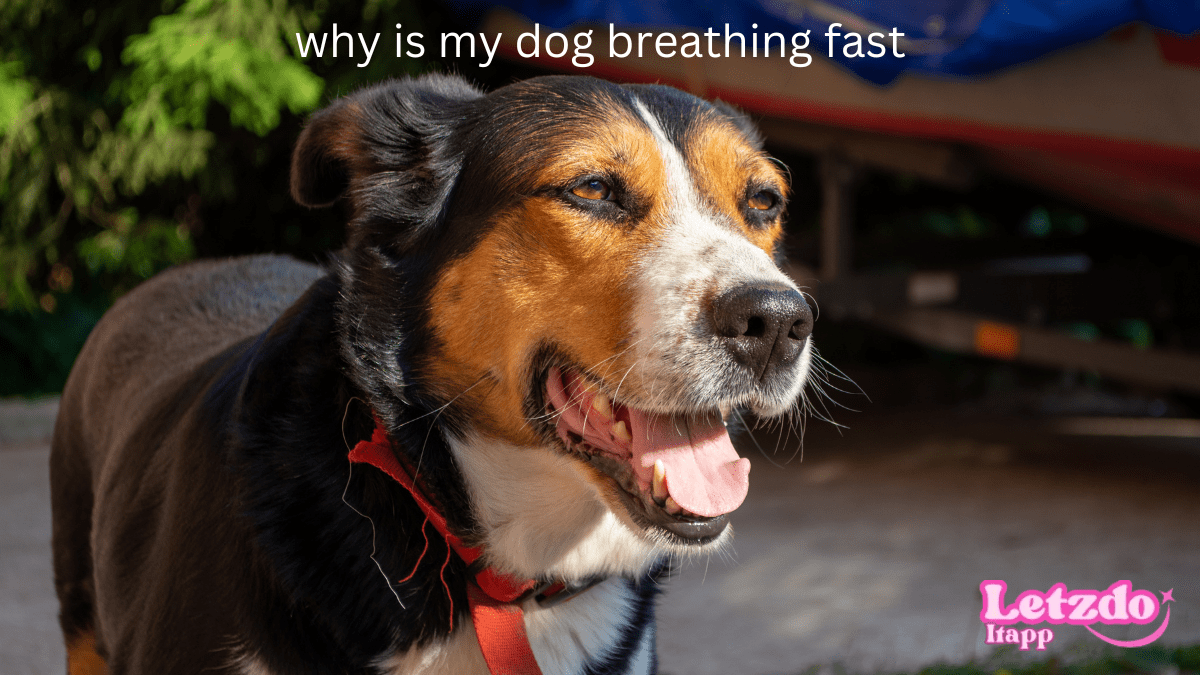Table of Contents
Why is my dog breathing fast? Many pet owners may ask this question at some point. Watching your dog take rapid breaths can be worrying, especially if you aren’t sure if it’s normal or something could be wrong. This guide will explore common causes of fast breathing in dogs, help you understand what it might mean, and guide you on when to seek veterinary help.
What Is Normal Breathing for Dogs?
Before diving into why your dog might be breathing fast, it’s essential to know what normal breathing looks like. Typically, a dog breathes 10 to 35 times per minute while at rest. This can vary based on your dog’s age, breed, and activity level. For instance, puppies or small breeds might breathe slightly faster than larger dogs, but rapid breathing outside these rates could signal a problem.
Why Is My Dog Breathing Fast? Common Causes
Why is my dog breathing fast? There are various explanations. Here are the most common reasons:
- Exercise or Excitement
- Dogs often breathe quickly after exercise or when they’re excited. This increased breathing rate is average and helps them cool down, as dogs regulate body temperature by panting. In such cases, your dog’s breathing should slow down within a few minutes once they’ve calmed or rested.
- Temperature Regulation
- Unlike humans, dogs can’t sweat like we do. Instead, they rely on panting to release heat. If your dog is in a warm environment or has been playing under the sun, they might breathe fast to cool down. Ensure they have access to water and shade to prevent overheating.
- Fear, Anxiety, or Stress
- Like people, dogs can feel anxious or scared, which may lead to fast breathing. Common triggers include thunderstorms, fireworks, or unfamiliar environments. If your dog tends to breathe rapidly during these events, comfort and reassurance can help calm them down.
- Age or Health Condition
- Older dogs or those with certain health conditions may breathe faster than usual. For example, dogs with arthritis or obesity may experience faster breathing. Monitoring your dog and consulting your vet can help you determine if age or health issues are contributing to their rapid breathing.
Medical Reasons for Fast Breathing in Dogs
Why is my dog breathing fast? It’s also essential to consider possible medical causes. Here are some health conditions that could lead to rapid breathing:
- Respiratory Infections
- If your dog has a respiratory infection, such as kennel cough or bronchitis, they may breathe quickly due to congestion or discomfort. Other signs of illness may include coughing, sneezing, or a runny nose.
- Heart Disease
- Heart issues in dogs can lead to rapid breathing as the heart struggles to pump oxygen efficiently. Breathing fast could be one of dogs’ earliest signs of heart disease. Look for additional symptoms like coughing, lethargy, or a bloated belly.
- Lung Issues
- Lung conditions like pneumonia or tumors can affect your dog’s breathing rate. These issues make it difficult for your dog to get enough oxygen, leading to rapid breaths. Additional signs include coughing, wheezing, and exercise intolerance.
- Pain or Injury
- Pain or injury can cause fast breathing as the dog’s body responds to discomfort. If your dog is breathing fast and seems unusually quiet, has a limp, or avoids being touched, they may be in pain and should be examined by a vet.
- Heatstroke
- Overheating or heatstroke is a severe condition in dogs that often leads to rapid breathing. If your dog has been in the sun for too long, they might be at risk of heatstroke, which requires immediate action. Signs include excessive panting, drooling, vomiting, and a high body temperature.
- Anemia
- Anemia, a condition without enough red blood cells, can cause fast breathing as your dog’s body tries to compensate for lower oxygen levels. Pale gums and weakness are also signs of anemia in dogs.
Also read: How long does it take to get green card after medical exam?
When to Seek Veterinary Help for Fast Breathing in Dogs
Why is my dog breathing fast? after observing the ordinary and medical causes, it may be time to visit the vet. Seek veterinary attention if:
- Your dog’s breathing remains fast for over 10 minutes without an apparent cause.
- Your dog shows other symptoms like coughing, lethargy, or changes in appetite.
- Breathing appears labored and noisy or involves heavy panting while resting.
- Your dog has been in a hot environment and shows signs of heatstroke.
It’s always better to be cautious. Rapid breathing might indicate an underlying health condition that only a vet can accurately diagnose.
How to Help a Dog with Fast Breathing at Home
If your dog is breathing fast but seems otherwise healthy, you can try a few steps to help them relax:
- Provide a Calm Environment
- Create a calm space if your dog’s rapid breathing is due to excitement or anxiety. Avoid loud noises, and try soft petting to reassure them.
- Cool Them Down
- If heat seems to be the cause, move your dog to a more relaxed area. Offer fresh water; if necessary, use a damp cloth to cool them down gently.
- Limit Strenuous Activity
- Don’t encourage active play or exercise if your dog is breathing quickly. Allow them time to rest, and avoid exercise during the hottest parts of the day.
- Monitor for Changes
- Keep a close eye on their breathing rate. Contact a vet for advice if it doesn’t slow down or other symptoms arise.
Also read: Fast Breathing in Dogs: What Pet Owners Need to Know
Why is my dog breathing fast? This is a question many pet owners worry about, but it’s often due to something harmless, like excitement or temperature. However, checking for possible health issues is essential when rapid breathing persists. Whether it’s due to an infection, a heart condition, or simply a reaction to exercise, understanding the cause of fast breathing in dogs is crucial for their well-being. Always prioritize your dog’s health, and remember that a quick check with the vet can make all the difference for your furry friend’s peace and comfort.





